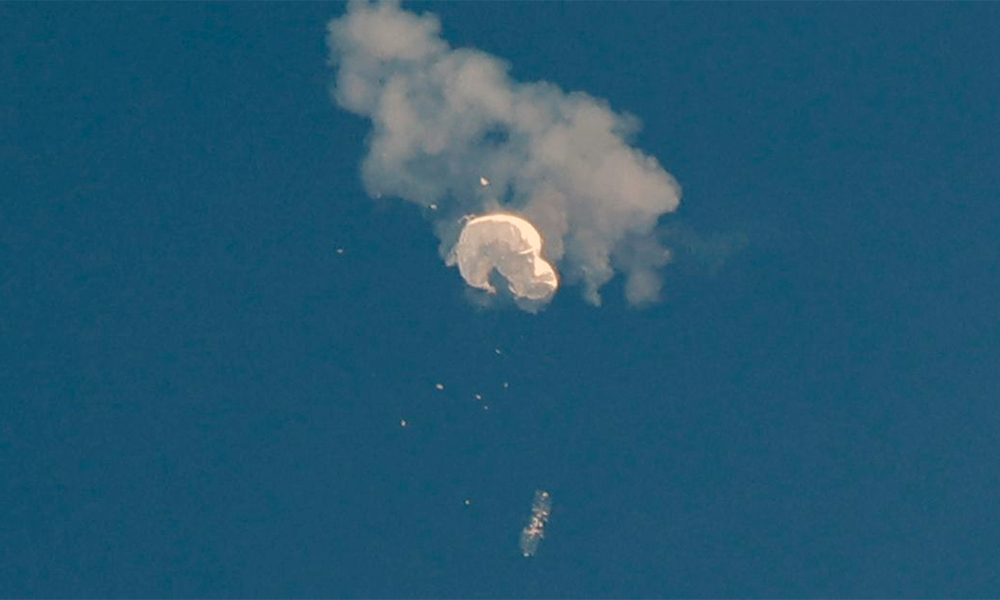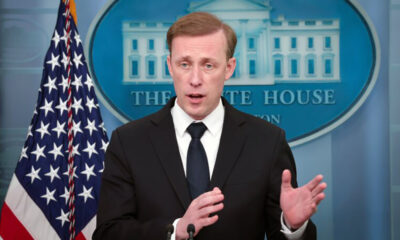World
US fighter jet shoots down suspected Chinese spy balloon

A US military fighter jet shot down a suspected Chinese spy balloon off the coast of South Carolina on Saturday, a week after it first entered US airspace and triggered a dramatic -- and public -- spying saga that worsened Sino-US relations, Reuters reported.
President Joe Biden said he had issued an order on Wednesday to take down the balloon, but the Pentagon had recommended waiting until it could be done over open water to safeguard civilians from debris crashing to Earth from thousands of feet (meters) above commercial air traffic.
"They successfully took it down, and I want to compliment our aviators who did it," Biden said.
Multiple fighter and refueling aircraft were involved in the mission, but only one -- an F-22 fighter jet from Langley Air Force Base in Virginia -- took the shot at 2:39 p.m. (1939 GMT), using a single AIM-9X supersonic, heat-seeking, air-to-air missile, a senior US military official said.
According to Reuters China strongly condemned the military strike on an airship that it says was used for meteorological and other scientific purposes, and which it said had strayed into US airspace "completely accidentally" -- claims flatly dismissed by US officials.
"China had clearly asked the US to handle this properly in a calm, professional and restrained manner," China's foreign ministry said in a statement. "The US had insisted on using force, obviously overreacting."
The balloon was shot down about six nautical miles off the US coast of the Atlantic Ocean, over relatively shallow water, potentially aiding efforts to recover elements of the Chinese surveillance equipment over the coming days, US officials said.
One US military official said the debris field was spread out over seven miles (11 km) of ocean, and multiple US military vessels were on site.
The downing of the balloon came shortly after the US government ordered a halt to flights in and out of three airports in South Carolina -- Wilmington, Myrtle Beach and Charleston -- due to what it said at the time was an undisclosed "national security effort." Flights resumed on Saturday afternoon, Reuters reported.
While Saturday's shootdown concludes the military dimension to the spying saga, Biden is likely to continue to face intense political scrutiny from Republican opponents in Congress who argue he failed to act quickly enough.
A senior administration official said after shooting down the balloon, the US government spoke directly with China about the action. The State Department also briefed allies and partners around the world, the official said.
Questions remain about how much information China may have gathered during the balloon's trek across the United States, read the report.
The balloon entered US airspace in Alaska on Jan. 28 before moving into Canadian airspace on Jan 30. It then re-entered US airspace over northern Idaho on Jan. 31, a US defense official said. Once it crossed over US land, it did not return to open waters, making a shootdown difficult.
US officials did not publicly disclose the balloon's presence over the United States until Thursday, Reuters reported.
"It's clear the Biden administration had hoped to hide this national security failure from Congress and the American people," said US Representative Mike Rogers, a Republican who leads the House of Representatives Armed Services Committee.
Biden's emphasis on Saturday that -- days ago -- he ordered the balloon shot down as soon as possible could be an effort to respond to such critics.
Former President Donald Trump, Biden's potential rival in the 2024 election, called earlier this week for the balloon to be shot down, and has sought to portray himself as stronger than Biden on China. The US relationship with China is likely to be a major theme of the 2024 presidential race.
Washington had called the balloon's appearance a "clear violation" of US sovereignty and notified Beijing about the shootdown on Saturday, a US official said.
Still, officials on Saturday appeared to play down the balloon's impact on US national security.
"Our assessment -- and we're going to learn more as we pick up the debris -- was that it was not likely to provide significant additive value over and above other (Chinese) intel capability, such as satellites in low-Earth orbit," the senior US defense official said.
A Reuters photographer who witnessed the shootdown said a stream came from a jet and hit the balloon, but there was no explosion. It then began to fall.
The Pentagon assesses that the balloon was part of a fleet of Chinese spy balloons. On Friday, it said another Chinese balloon was flying over Latin America.
"Over the past several years, Chinese balloons have previously been spotted over countries across five continents, including in East Asia, South Asia and Europe," the US official said.
The suspected spy balloon prompted Secretary of State Antony Blinken to postpone a visit to China this week that had been expected to start on Friday, Reuters reported.
The postponement of Blinken's trip, which had been agreed to in November by Biden and Chinese President Xi Jinping, was a blow to those who saw it as an overdue opportunity to stabilize an increasingly fractious relationship between the two countries.
China is keen for a stable US relationship so it can focus on its economy, battered by the now-abandoned zero-COVID policy and neglected by foreign investors alarmed by what they see as a return of state intervention in the market.
World
More than 30 dead in Brazil bus and truck collision
The truck driver fled the scene, and three occupants of a car that collided with the truck and became trapped underneath survived the accident, said the fire department.

A packed bus collided with a truck and burst into flames early on Saturday in Brazil, killing more than 30 people, the fire department said.
After removing all of the victims from a major highway near the town of Teofilo Otoni in Minas Gerais, the state's fire department reported that of the 45 people on the bus, 38, including the bus driver, had been confirmed dead.
The other passengers remained in critical condition after being transported to a local hospital.
The truck driver fled the scene, and three occupants of a car that collided with the truck and became trapped underneath survived the accident, said the fire department.
President Luiz Inacio Lula da Silva stated on social media that the government was ready to provide whatever assistance was needed, and that the Federal Highway Policy was at the site.
"I deeply mourn and extend my prayers to the families of the more than 30 victims of the accident in Teofilo Otoni, Minas Gerais. I pray for the recovery of the survivors of this terrible tragedy," he wrote on X.
A forensic investigation will be required to determine the accident's cause, as differing accounts were gathered from witness testimonies, said the local fire department.
Initially, firefighters reported the bus had a tire blowout, causing the driver to lose control before colliding at around 4 a.m. local time, with an oncoming truck on the BR-116 federal highway, a major route connecting Brazil's densely populated southeast to the poorer northeast.
However, witnesses also reported that a granite block the truck was transporting came loose, fell on the road and caused the collision with the bus, said the fire department.
"Only the forensic investigation will confirm the true version," said the fire department in a statement.
The bus departed from Sao Paulo and was headed to the state of Bahia.
World
Biden approves $571 mln in defense support for Taiwan

U.S. President Joe Biden on Friday agreed to provide $571.3 million in defense support for Taiwan, the White House said, while the State Department approved the potential sale to the island of $265 million worth of military equipment.
The United States is bound by law to provide Chinese-claimed Taiwan with the means to defend itself despite the lack of formal diplomatic ties between Washington and Taipei, to the constant anger of Beijing, Reuters reported.
Democratically governed Taiwan rejects China's claims of sovereignty.
China has stepped up military pressure against Taiwan, including daily military activities near the island and two rounds of war games this year.
Taiwan went on alert last week in response to what it said was China's largest massing of naval forces in three decades around Taiwan and in the East and South China Seas.
Biden had delegated to the secretary of state the authority "to direct the drawdown of up to $571.3 million in defense articles and services of the Department of Defense, and military education and training, to provide assistance to Taiwan," the White House said in a statement without providing details.
Taiwan's defense ministry thanked the United States for its "firm security guarantee", saying in a statement the two sides would continue to work closely on security issues to ensure peace in the Taiwan Strait.
The Pentagon said the State Department had approved the potential sale to Taiwan of about $265 million worth of command, control, communications, and computer modernization equipment.
Taiwan's defense ministry said the equipment sale would help upgrade its command-and-control systems.
Taiwan's defense ministry also said on Saturday that the U.S. government had approved $30 million of parts for 76 mm autocannon, which it said would boost the island's capacity to counter China's "grey-zone" warfare.
World
Trump-backed spending deal fails in House, shutdown approaches

A spending bill backed by Donald Trump failed in the U.S. House of Representatives on Thursday as dozens of Republicans defied the president-elect, leaving Congress with no clear plan to avert a fast-approaching government shutdown that could disrupt Christmas travel.
The vote laid bare fault lines in Trump's Republican Party that could surface again next year when they control the White House and both chambers of Congress, Reuters reported.
Trump had pressured lawmakers to tie up loose ends before he takes office on Jan. 20, but members of the party's right flank refused to support a package that would increase spending and clear the way for a plan that would add trillions more to the federal government's $36 trillion in debt.
"I am absolutely sickened by a party that campaigns on fiscal responsibility and has the temerity to go to the American people and say you think this is fiscally responsible," said Republican Representative Chip Roy, one of 38 Republicans who voted against the bill.
The package failed by a vote of 174-235 just hours after it was hastily assembled by Republican leaders seeking to comply with Trump's demands. A prior bipartisan deal was scuttled after Trump and the world's richest person Elon Musk came out against it on Wednesday.
Republican House Speaker Mike Johnson provided no details when reporters asked him about next steps after the failed vote.
"We will come up with another solution," he said.
Government funding is due to expire at midnight on Friday. If lawmakers fail to extend that deadline, the U.S. government will begin a partial shutdown that would interrupt funding for everything from border enforcement to national parks and cut off paychecks for more than 2 million federal workers. The U.S. Transportation Security Administration warned that travelers during the busy holiday season could face long lines at airports.
"Congress must get rid of, or extend out to, perhaps, 2029, the ridiculous Debt Ceiling. Without this, we should never make a deal," Trump said in a post on Truth Social hours after the bill failed.
Thursday's unsuccessful bill largely resembled the earlier version that Musk and Trump had blasted as a wasteful giveaway to Democrats. It would have extended government funding into March and provided $100 billion in disaster relief and suspended the debt. Republicans dropped other elements that had been included in the original package, such as a pay raise for lawmakers and new rules for pharmacy benefit managers.
At Trump's urging, the new version also would have suspended limits on the national debt for two years -- a maneuver that would make it easier to pass the dramatic tax cuts he has promised.
Johnson before the vote told reporters that the package would avoid disruption, tie up loose ends and make it easier for lawmakers to cut spending by hundreds of billions of dollars when Trump takes office next year.
"Government is too big, it does too many things, and it does few things well," he said.
TEEING UP TAX CUT
Democrats blasted the bill as a cover for a budget-busting tax cut that would largely benefit wealthy backers such as Musk, the world's richest person, while saddling the country with trillions of dollars in additional debt.
"How dare you lecture America about fiscal responsibility, ever?" House Democratic Leader Hakeem Jeffries said during floor debate.
Even if the bill had passed the House, it would have faced long odds in the Senate, which is currently controlled by Democrats. The White House said Democratic President Joe Biden did not support it.
Previous fights over the debt ceiling have spooked financial markets, as a U.S. government default would send credit shocks around the world. The limit has been suspended under an agreement that technically expires on Jan. 1, though lawmakers likely will not have to tackle the issue before the spring.
When he returns to office, Trump aims to enact tax cuts that could reduce revenues by $8 trillion over 10 years, which would drive the debt higher without offsetting spending cuts. He has vowed not to reduce retirement and health benefits for seniors that make up a vast chunk of the budget and are projected to grow dramatically in the years to come.
The last government shutdown took place in December 2018 and January 2019 during Trump's first White House term.
The unrest also threatened to topple Johnson, a mild-mannered Louisianan who was thrust unexpectedly into the speaker's office last year after the party's right flank voted out then-Speaker Kevin McCarthy over a government funding bill. Johnson has repeatedly had to turn to Democrats for help in passing legislation when he has been unable to deliver the votes from his own party.
He tried the same maneuver on Thursday, but this time fell short.
Several Republicans said they would not vote for Johnson as speaker when Congress returns in January, potentially setting up another tumultuous leadership battle in the weeks before Trump takes office.
-

 World4 days ago
World4 days agoNorth Korean troops suffer 100 deaths, struggling in drone warfare, South Korea says
-

 Latest News2 days ago
Latest News2 days agoAfghan men must stand with women to support viable future of country: US envoy
-

 Latest News4 days ago
Latest News4 days agoTwo horror accidents on Kabul-Kandahar highway leave 52 dead
-

 Sport4 days ago
Sport4 days agoAfghanistan crush Zimbabwe by 232 runs in second ODI
-

 International Sports5 days ago
International Sports5 days agoLanka T10: Kandy Bolts in at 4th spot in playoffs after thrilling day
-

 Sport4 days ago
Sport4 days agoBangla Tigers lift Lanka T10 Super League title
-

 Regional3 days ago
Regional3 days agoPakistan’s missile program is ’emerging threat’, top US official says
-

 Latest News4 days ago
Latest News4 days agoThere are many differences between Syria and IEA: Ahmad al-Sharaa
























